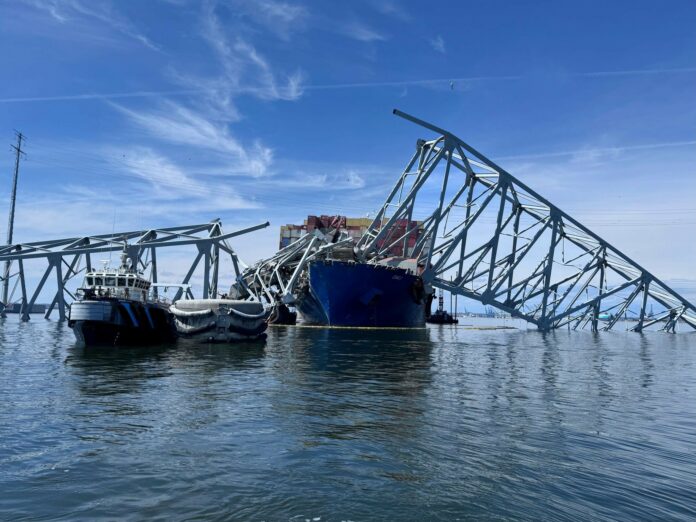Reporting by Samuel Adam Lopez, Legal Analyst (For more insights, visit USA Herald and read more from Samuel A. Lopez)
(USA Herald) – The recent collapse of the Francis Scott Key Bridge in Baltimore, Maryland, could have significant ripple effects beyond the immediate transportation disruptions. According to industry experts, the disaster has the potential to trigger a rise in reinsurance costs, ultimately impacting consumers through higher insurance premiums.
The bridge, a vital artery for commerce, was insured by a consortium of roughly 80 reinsurance companies. These firms essentially function as safety nets for insurance companies, providing coverage for large, unforeseen events. Early estimates suggest a collective payout of $2 billion to $4 billion – a hefty sum that could strain reinsurers’ resources and profits.
The Baltimore Bridge’s collapse underscores a broader, troubling trend of rising catastrophe payouts, which reached $108 billion last year, outpacing the decade’s average. With global marine insurance premiums already inflating due to geopolitical tensions, the incident adds pressure to an already stressed system.
Potential Price Hikes for Consumers
Samuel Lopez, a Legal Analyst with the USA Herald and a seasoned expert on insurance industry practices, sees a potential domino effect. “In the wake of such a significant payout,” Lopez observes, “reinsurance companies may be forced to adjust their pricing models. This could lead them to hike premiums charged to insurance providers, which unfortunately might translate to higher insurance costs for consumers down the line.” https://usaherald.com/author/samuel-lopez/
This potential increase comes at a time when insurance costs are already on the rise. Data from the Federal Reserve Bank of St. Louis indicates a 28% jump in auto insurance premiums since January 2021. Additionally, tenant and homeowner insurance have witnessed increases of around 4.1% in the past year. These trends, coupled with inflation and a general uptick in claims, have already placed a strain on household budgets.
Beyond the Bridge: Broader Implications
The bridge collapse carries broader implications beyond potential insurance hikes. The vital transportation link is currently out of commission, causing significant disruption to daily commutes and potentially impacting local businesses reliant on timely deliveries. Additionally, emergency response times could be affected, raising concerns about public safety.
Let’s take a Deeper Look at Some of These Broader Implications
Transportation Disruptions:
-
- The bridge serves as a vital transportation link, connecting different parts of the city and facilitating the movement of people, goods, and services.
- Its collapse will disrupt daily commutes, leading to longer travel times and potential congestion on alternative routes.
- Residents, commuters, and businesses relying on the bridge will face inconvenience and delays.
Economic Impact:
-
- The bridge collapse will affect local businesses, especially those dependent on timely deliveries and transportation.
- Supply chains will be disrupted, impacting the availability of goods and services.
- Businesses near the bridge will experience reduced foot traffic due to detours and closures.
Emergency Services and Response:
-
- Emergency services (police, fire, medical) rely on efficient transportation routes.
- The collapse could delay emergency response times, affecting public safety.
Property Values and Real Estate:
-
- Properties near the bridge may experience decreased values due to reduced accessibility.
- Homeowners and renters might face challenges selling or renting properties in the affected area.
Psychological Impact:
-
- The sudden collapse of a major infrastructure piece can cause anxiety and fear among residents.
- People may worry about the safety of other bridges and structures.
Cost of Reconstruction:
-
- Taxpayers will bear the brunt of financial burden of rebuilding the bridge.
- Funds allocated for reconstruction could impact other public projects and services.
Looking Ahead: Rebuilding and Resilience
The rebuilding of the bridge will be a costly endeavor, placing a financial burden on taxpayers. However, the long-term benefits of a revamped infrastructure system outweigh the short-term economic impact.
The Baltimore bridge collapse serves as a stark reminder of the complex interplay between infrastructure, insurance, and everyday life. While the full impact on insurance prices remains to be seen, the potential for higher costs underscores the importance of investing in resilient infrastructure and ensuring the smooth functioning of communities across the nation.
For more news and insights on the insurance industry and consumer issues, visit USA Herald: https://usaherald.com/



